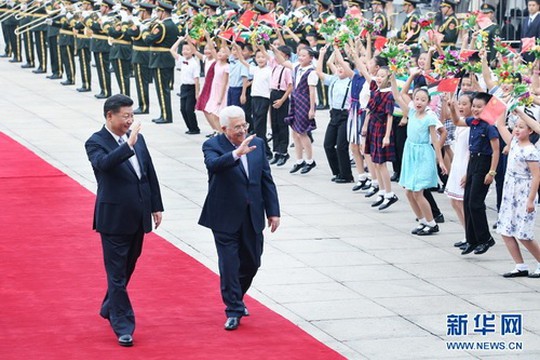Chinese President Xi Jinping (L) with the visiting Palestine President Mahmoud Abbas, Beijing, 2017
The US Secretary of State Antony Blinken drew a blank in Riyadh in his mission to coax Saudi Arabia to grant diplomatic recognition to Israel and resuscitate the moribund Abraham Accord. The Saudi stance is unwavering: a two-state solution to Palestine problem first; normalisation with Israel can only come after that, notes M.K. Bhadrakumar, Indian Ambassador and prominent international observer.
The Saudi Foreign Minister Prince Faisal bin Farhan Al Saud said at his joint press conference with Blinken that “without finding a pathway to peace for the Palestinian people, without addressing that challenge, any normalisation will have limited benefits. And therefore, I think we should continue to focus on finding a pathway towards a two-state solution, on finding a pathway towards giving the Palestinians dignity and justice. And I think the US has a similar view, that it’s important to continue on those efforts.”
Blinken later called Israeli Prime Minister Benjamin Netanyahu to brief him. The state department readout mentioned that they “discussed areas of mutual interest, including expanding and deepening Israel’s integration into the Middle East through normalisation with countries in the region.”
After the Saudi snub to the US, Beijing announced that at the invitation of Chinese President Xi Jinping, Palestinian President Mahmoud Abbas will pay a state visit to China from June 13 to 16. On the same day, at the daily press briefing, the Chinese Foreign Ministry spokesman Wang Wenbin effusively spoke of Abbas and “the high-level friendly relations between China and Palestine.” Wang reiterated Beijing’s intention to mediate between Palestine and Israel and mentioned President Xi’s hands-on role.
In the Chinese political system, the foreign ministry rarely invokes the name of Xi Jinping. At the very least, Abbas’s visit to China and China’s public diplomacy track on the whole would suggest that Beijing may have sounded Israel and other important stakeholders — Saudi Arabia, in particular — and found that the early signs are encouraging.
With Abraham Accord turning into a pipe dream, Israel has nowhere to go and nothing more to lose as it emerges that the US is struggling to shore up its regional influence.
Without doubt, Palestine problem is at the core of the Middle East crisis. For the past four decades, the US and Israel deflected attention by whipping up paranoia about Shia Iran’s threat to the Sunni Arab regimes but with the Saudi-Iranian normalisation, it appears Washington and Tel Aviv hoisted their own petard.
By the way, Prince Faisal underscored at Thursday’s press conference with Blinken: “China is an important partner for the kingdom and most countries in the region, and I think that partnership has given us and China significant benefits. And that cooperation is likely to grow just because China’s economic impact in the region and beyond is likely to grow as its economy continues to grow.”
This is also where Recep Erdogan’s victory in the Turkish election becomes a tipping point, as it has a multiplier effect on the regional yearnings for a new dawn that were eloquently framed by Prince Faisal. Indeed, the mediation on the Saudi-Iranian rapprochement lends credibility to Beijing’s initiative on the Palestine issue. Russia whole-heartedly backs the initiative. (Moscow is also navigating Saudi Arabia’s membership of BRICS for an early decision.)
That said, Palestine issue has proved to be intractable so far. But then, the crux of the matter is that Washington was lacking in dedication and sincerity of purpose and US domestic politics played havoc. The US had all the advantages but it looked at any Palestinian settlement primarily through the geopolitical prism with a view to preserve its regional hegemony, control the oil market, punish Iran and use the Iran bogey to promote arms sales, exclude Russia from the region, and above all, pin down the regional states to the petrodollar phenomenon which sustains dollar’s status as reserve currency.
Evidently, Israel is brooding about a dark future. The old swagger has vanished. Netanyahu looks tired and old. Whereas, from the full height of its regional prestige today, China is well-placed to offer to Israel a new creative pathway backed by all regional states, which even the non-state actors of the so-called “axis of resistance” will not dare to undermine.
read more in our Telegram-channel https://t.me/The_International_Affairs

 10:47 14.06.2023 •
10:47 14.06.2023 •























